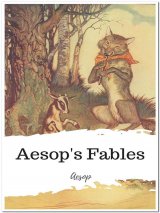Aesop's Fables Page #11
Aesop's Fables, or the Aesopica, is a collection of fables credited to Aesop, a slave and storyteller believed to have lived in ancient Greece between 620 and 564 BCE.
THE LION, THE BEAR, AND THE FOX A Lion and a Bear were fighting for possession of a kid, which they had both seized at the same moment. The battle was long and fierce, and at length both of them were exhausted, and lay upon the ground severely wounded and gasping for breath. A Fox had all the time been prowling round and watching the fight: and when he saw the combatants lying there too weak to move, he slipped in and seized the kid, and ran off with it. They looked on helplessly, and one said to the other, "Here we've been mauling each other all this while, and no one the better for it except the Fox!" THE BLACKAMOOR A Man once bought an Ethiopian slave, who had a black skin like all Ethiopians; but his new master thought his colour was due to his late owner's having neglected him, and that all he wanted was a good scrubbing. So he set to work with plenty of soap and hot water, and rubbed away at him with a will, but all to no purpose: his skin remained as black as ever, while the poor wretch all but died from the cold he caught. THE TWO SOLDIERS AND THE ROBBER Two Soldiers travelling together were set upon by a Robber. One of them ran away, but the other stood his ground, and laid about him so lustily with his sword that the Robber was fain to fly and leave him in peace. When the coast was clear the timid one ran back, and, flourishing his weapon, cried in a threatening voice, "Where is he? Let me get at him, and I'll soon let him know whom he's got to deal with." But the other replied, "You are a little late, my friend: I only wish you had backed me up just now, even if you had done no more than speak, for I should have been encouraged, believing your words to be true. As it is, calm yourself, and put up your sword: there is no further use for it. You may delude others into thinking you're as brave as a lion: but I know that, at the first sign of danger, you run away like a hare." THE LION AND THE WILD ASS A Lion and a Wild Ass went out hunting together: the latter was to run down the prey by his superior speed, and the former would then come up and despatch it. They met with great success; and when it came to sharing the spoil the Lion divided it all into three equal portions. "I will take the first," said he, "because I am King of the beasts; I will also take the second, because, as your partner, I am entitled to half of what remains; and as for the third--well, unless you give it up to me and take yourself off pretty quick, the third, believe me, will make you feel very sorry for yourself!" Might makes right. THE MAN AND THE SATYR A Man and a Satyr became friends, and determined to live together. All went well for a while, until one day in winter-time the Satyr saw the Man blowing on his hands. "Why do you do that?" he asked. "To warm my hands," said the Man. That same day, when they sat down to supper together, they each had a steaming hot bowl of porridge, and the Man raised his bowl to his mouth and blew on it. "Why do you do that?" asked the Satyr. "To cool my porridge," said the Man. The Satyr got up from the table. "Good-bye," said he, "I'm going: I can't be friends with a man who blows hot and cold with the same breath." THE IMAGE-SELLER A certain man made a wooden Image of Mercury, and exposed it for sale in the market. As no one offered to buy it, however, he thought he would try to attract a purchaser by proclaiming the virtues of the Image. So he cried up and down the market, "A god for sale! a god for sale! One who'll bring you luck and keep you lucky!" Presently one of the bystanders stopped him and said, "If your god is all you make him out to be, how is it you don't keep him and make the most of him yourself?" "I'll tell you why," replied he; "he brings gain, it is true, but he takes his time about it; whereas I want money at once." THE EAGLE AND THE ARROW An Eagle sat perched on a lofty rock, keeping a sharp look-out for prey. A huntsman, concealed in a cleft of the mountain and on the watch for game, spied him there and shot an Arrow at him. The shaft struck him full in the breast and pierced him through and through. As he lay in the agonies of death, he turned his eyes upon the Arrow. "Ah! cruel fate!" he cried, "that I should perish thus: but oh! fate more cruel still, that the Arrow which kills me should be winged with an Eagle's feathers!" THE RICH MAN AND THE TANNER A Rich Man took up his residence next door to a Tanner, and found the smell of the tan-yard so extremely unpleasant that he told him he must go. The Tanner delayed his departure, and the Rich Man had to speak to him several times about it; and every time the Tanner said he was making arrangements to move very shortly. This went on for some time, till at last the Rich Man got so used to the smell that he ceased to mind it, and troubled the Tanner with his objections no more. THE WOLF, THE MOTHER, AND HER CHILD A hungry Wolf was prowling about in search of food. By and by, attracted by the cries of a Child, he came to a cottage. As he crouched beneath the window, he heard the Mother say to the Child, "Stop crying, do! or I'll throw you to the Wolf." Thinking she really meant what she said, he waited there a long time in the expectation of satisfying his hunger. In the evening he heard the Mother fondling her Child and saying, "If the naughty Wolf comes, he shan't get my little one: Daddy will kill him." The Wolf got up in much disgust and walked away: "As for the people in that house," said he to himself, "you can't believe a word they say." THE OLD WOMAN AND THE WINE-JAR An old Woman picked up an empty Wine-jar which had once contained a rare and costly wine, and which still retained some traces of its exquisite bouquet. She raised it to her nose and sniffed at it again and again. "Ah," she cried, "how delicious must have been the liquid which has left behind so ravishing a smell." THE LIONESS AND THE VIXEN A Lioness and a Vixen were talking together about their young, as mothers will, and saying how healthy and well-grown they were, and what beautiful coats they had, and how they were the image of their parents. "My litter of cubs is a joy to see," said the Fox; and then she added, rather maliciously, "But I notice you never have more than one." "No," said the Lioness grimly, "but that one's a lion." Quality, not quantity. THE VIPER AND THE FILE A Viper entered a carpenter's shop, and went from one to another of the tools, begging for something to eat. Among the rest, he addressed himself to the File, and asked for the favour of a meal. The File replied in a tone of pitying contempt, "What a simpleton you must be if you imagine you will get anything from me, who invariably take from every one and never give anything in return." The covetous are poor givers. THE CAT AND THE COCK A Cat pounced on a Cock, and cast about for some good excuse for making a meal off him, for Cats don't as a rule eat Cocks, and she knew she ought not to. At last she said, "You make a great nuisance of yourself at night by crowing and keeping people awake: so I am going to make an end of you." But the Cock defended himself by saying that he crowed in order that men might wake up and set about the day's work in good time, and that they really couldn't very well do without him. "That may be," said the Cat, "but whether they can or not, I'm not going without my dinner"; and she killed and ate him.
Translation
Translate and read this book in other languages:
Select another language:
- - Select -
- 简体中文 (Chinese - Simplified)
- 繁體中文 (Chinese - Traditional)
- Español (Spanish)
- Esperanto (Esperanto)
- 日本語 (Japanese)
- Português (Portuguese)
- Deutsch (German)
- العربية (Arabic)
- Français (French)
- Русский (Russian)
- ಕನ್ನಡ (Kannada)
- 한국어 (Korean)
- עברית (Hebrew)
- Gaeilge (Irish)
- Українська (Ukrainian)
- اردو (Urdu)
- Magyar (Hungarian)
- मानक हिन्दी (Hindi)
- Indonesia (Indonesian)
- Italiano (Italian)
- தமிழ் (Tamil)
- Türkçe (Turkish)
- తెలుగు (Telugu)
- ภาษาไทย (Thai)
- Tiếng Việt (Vietnamese)
- Čeština (Czech)
- Polski (Polish)
- Bahasa Indonesia (Indonesian)
- Românește (Romanian)
- Nederlands (Dutch)
- Ελληνικά (Greek)
- Latinum (Latin)
- Svenska (Swedish)
- Dansk (Danish)
- Suomi (Finnish)
- فارسی (Persian)
- ייִדיש (Yiddish)
- հայերեն (Armenian)
- Norsk (Norwegian)
- English (English)
Citation
Use the citation below to add this book to your bibliography:
Style:MLAChicagoAPA
"Aesop's Fables Books." Literature.com. STANDS4 LLC, 2025. Web. 10 Jan. 2025. <https://www.literature.com/book/aesop%27s_fables_316>.




Discuss this Aesop's Fables book with the community:
Report Comment
We're doing our best to make sure our content is useful, accurate and safe.
If by any chance you spot an inappropriate comment while navigating through our website please use this form to let us know, and we'll take care of it shortly.
Attachment
You need to be logged in to favorite.
Log In